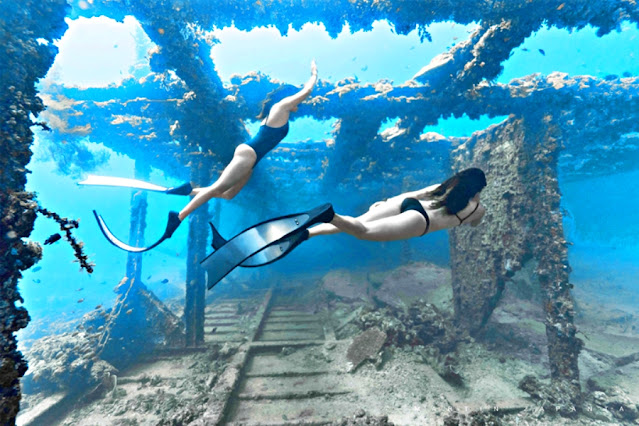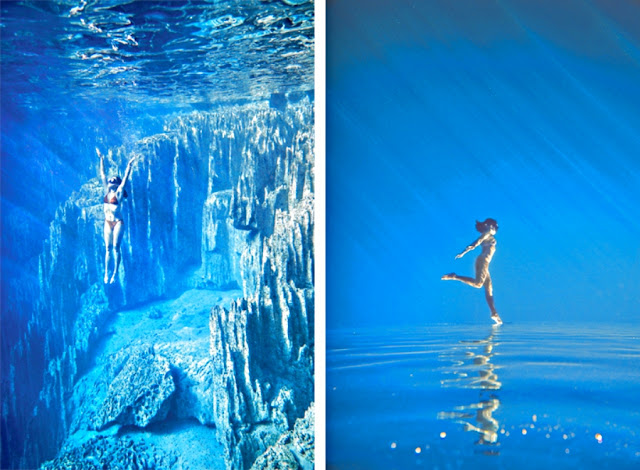I was a few minutes into taking a seat inside Black Scoop Café in Maginhawa Street when a towering morena lady walked through the door. I instantly recognized her as Marese Secades—a freediver whose spectacular underwater photographs arrested my attention.
 |
| Freediver Marese Secades sets the women’s record at 59 meters. |
A few days earlier, I reached out to her and during our exchange of messages she casually mentioned being the Filipina freediver who freedived the deepest to date. Astounded at this piece of information, I asked her if I can interview her in person for an article about freediving—to which she happily obliged.
The moment she sat across the table, she quickly started telling her freediving journey. “A friend of mine invited me to join an intro class. I said yes and joined them on a beach trip where I was informally taught how to freedive,” Secades recalled.
 |
| There are now more than 10,000 freedivers in the Philippines |
After telling her of my fears about the open water, Marese assured me there’s nothing to fear and described each freediving session as a soulful experience “the overwhelming feeling of calm and peace is so indescribable.”
“Freediving is diving on breath hold with no breathing apparatus. Some of the original freedivers are from the Philippines. They are the Badjao or otherwise known as ‘Sea Gypsies’ of Celebes Sea,” Secades explained.
Setting a freediving record
After her informal introduction to the sport of freediving, Secades took it to a notch higher—in terms of preparation and dedication by undergoing professional training. It didn’t take long before her journey led her to Panglao, Bohol, on May 18 and 19, where she set a women’s record of 59 meters (193 feet) during the Philippine Depth National Championship.
 |
| During a freedive, there’s that feeling of calm and peace. “It is not a hobby, it’s a lifestyle,” Secades says on freediving. |
“I had to be completely focused during each second of my dive. It was vital to keep my equalization and relaxation always in check. If I let my mind wander, it can easily distract me a million ways,” Secades said as she recalled her state of mind during her record-setting freedive.
It was also in the island of Panglao where she found the best place to train for the competition. “I had to move from Manila to Panglao two months ahead of time to prepare myself in all possible ways. I signed up for regular training sessions at Freedive Panglao, which is considered as one of the best in the world under the coaching of freediving world champion Alenka Artnik,” she said.
Freediving scene in the
Philippines
The Philippines has long been renowned as a scuba diving haven where many of the world’s best diving spots can be found. There’s Tubbataha Reef, Verde Passage, Panglao in Bohol, Puerto Galera in Oriental Mindoro and Anilao, Batangas, to state just a few. Because of the abundance of underwater gems surrounding our archipelago, it didn’t come as a surprise to learn that the sport of freediving thrived and has created a growing community.
“Philippine freediving is booming! At the moment, there are over 10,000 Filipino freedivers which is a big jump from less than a hundred three years ago. There are also around 30 certified Filipino freediving instructors around the country. It’s getting bigger and bigger, and many are now getting into competitive freediving,” Secades said.
After my short conversation with Marese Secades, it occurred to me the allegory in her passion. While she holds her breath each time she goes underwater—for a minute or two—diving into depths of dozens of meters before ascending to the surface, in real life nowadays, she spends her every breathing moment embracing the sport.
Freediving to her isn’t just a recreational activity anymore. Apart from being an instructor in Apnea Philippines, Marese also devotes more time training for the sport and incorporating all the understanding she learns from it into her lifestyle.
“Training for freediving does not start when you are in the water, it starts the night before. You have to make sure you eat a proper diet, get enough rest and exercise. Meditation is also a huge factor in training as it quiets and trains your mind. One needs to live, eat and breathe freediving, it is not a hobby, it’s a lifestyle,” Secades told me.
The way she described her dedication to the sport of freediving sounded to me like a very complex and disciplined daily routine. However, when I started to look at her underwater photographs again, I understand fully why she’s into it so much. As each photograph blows my mind away, I inch closer to one day trying freediving—all thanks to Marese for inspiring me.
Photos by Marese Secades, Jake Alejandre & Martin Zapanta
This article first appeared on BusinessMirror
Klook.com






















